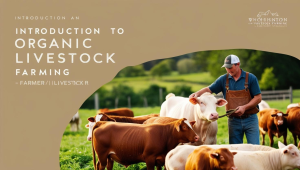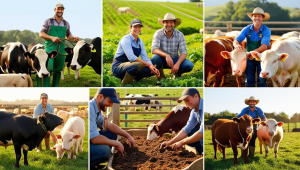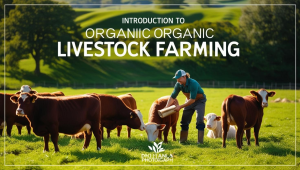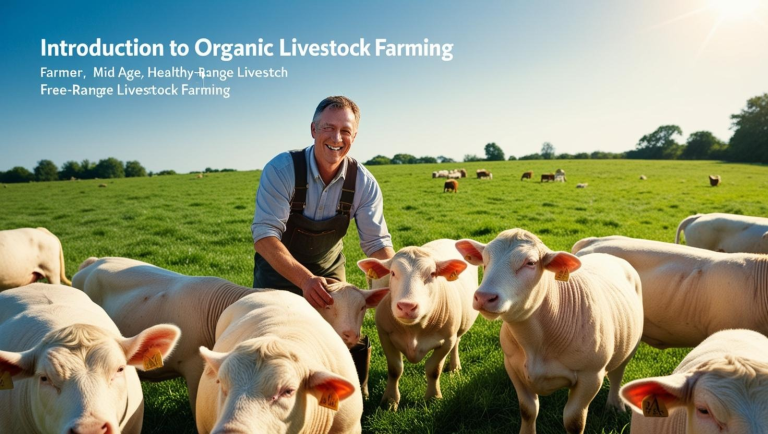What is Organic Livestock Farming?
Click HERE to join our WhatsApp group
Organic livestock farming is an agricultural system that emphasizes sustainable, ethical, and environmentally friendly practices in raising animals for meat, dairy, eggs, and other animal-based products. This approach focuses on natural methods of animal husbandry, ensuring high welfare standards, prohibiting synthetic chemicals, and minimizing environmental impact. Organic farming promotes biodiversity, soil health, and humane animal treatment while avoiding artificial additives, antibiotics, and genetically modified organisms (GMOs).
Principles of Organic Livestock Farming
Organic livestock farming is built upon several key principles that differentiate it from conventional farming methods:
Animal Welfare: Ensuring livestock have access to fresh air, pasture, and ample space to exhibit natural behaviors.
Natural Feed and Nutrition: Feeding animals organic, non-GMO, and pesticide-free diets without synthetic additives or antibiotics.
Sustainable Land Management: Using rotational grazing and organic fertilizers to enhance soil health and prevent land degradation.
No Synthetic Chemicals: Avoiding synthetic pesticides, fertilizers, hormones, and antibiotics in livestock management.
Biodiversity Conservation: Promoting diverse ecosystems and reducing environmental pollution.
Ethical Practices: Respecting animal welfare by providing stress-free environments and humane handling.
Benefits of Organic Livestock Farming

Organic livestock farming offers numerous advantages for farmers, consumers, and the environment.
1. Healthier Animal Products
Organic meat, milk, and eggs are free from synthetic hormones, antibiotics, and GMOs.
Higher levels of omega-3 fatty acids, antioxidants, and essential nutrients.
Reduced risk of antibiotic-resistant bacteria.
READ ALSO: Common ways to manage bacteria diseases in poultry
2. Environmental Benefits
Reduced soil and water contamination due to the absence of chemical fertilizers and pesticides.
Improved biodiversity through eco-friendly farming techniques.
Lower greenhouse gas emissions due to sustainable pasture management.
3. Improved Animal Welfare
Livestock are raised in stress-free environments with access to outdoor grazing.
No confinement in factory-like conditions, reducing disease risks.
Natural breeding and feeding systems promote healthier growth and longevity.
4. Economic and Social Advantages
Growing consumer demand for organic products can provide premium pricing.
Promotes local farming and community-based agriculture.
Encourages traditional and sustainable farming practices.
Key Requirements for Organic Livestock Farming

To be certified organic, farmers must adhere to strict guidelines set by organic certification bodies such as USDA Organic (United States), EU Organic, and other national standards.
1. Organic Feed and Grazing
Animals must be fed 100% organic feed, free from synthetic additives, pesticides, and GMOs.
Livestock should have access to pasture for grazing whenever possible.
Prohibition of growth hormones and antibiotics in animal feed.
READ ALSO: Pig Feed Formulation and Nutritional Requirements
2. Ethical Animal Husbandry
Animals must have access to outdoor spaces, fresh air, and natural light.
Use of humane treatment methods, avoiding inhumane confinement systems.
Natural breeding practices instead of artificial growth enhancers.
3. Disease Prevention and Veterinary Care
Focus on natural disease prevention through proper nutrition and hygiene.
Use of herbal remedies and homeopathy instead of synthetic medications.
Antibiotics and synthetic drugs are only used in extreme cases, and animals treated with them lose their organic status.
4. Sustainable Waste and Resource Management
Proper manure management to prevent water contamination.
Use of composting and organic fertilizers to enrich soil health.
Reducing farm waste and implementing eco-friendly recycling methods.
Common Organic Livestock Farming Practices
READ ALSO: Common Sheep Diseases and Their Control

Different types of livestock farming follow unique organic management strategies to ensure sustainability and health.
1. Organic Dairy Farming
Cows are primarily pasture-fed with organic forage.
No synthetic hormones or antibiotics.
Stress-free milking practices and humane handling of animals.
2. Organic Poultry Farming
Chickens are free-range and provided organic grains.
No artificial lighting to stimulate rapid egg production.
Prevention of overcrowding to reduce disease risks.
3. Organic Beef and Meat Production
Cattle and sheep are grass-fed with access to open pastures.
No artificial growth promoters or antibiotics.
Ethical slaughtering practices that minimize stress.
4. Organic Pig Farming
Pigs are provided spacious outdoor enclosures with organic feed.
No tail docking or other inhumane practices.
Encouragement of natural foraging behaviors.
Challenges in Organic Livestock Farming
Despite its many benefits, organic livestock farming comes with challenges that farmers must address.
1. Higher Costs
Organic feed and land management practices are often more expensive.
Initial investment in pasture development and certification can be high.
READ ALSO: Supplementary Feeding for Sheep and Goats
2. Disease Management
Limited access to synthetic medications makes disease prevention critical.
Farmers must rely on herbal and natural remedies for treating illnesses.
3. Certification Process
Farmers must adhere to strict regulations and undergo audits.
Certification can be time-consuming and costly.
4. Market Competition
Organic farmers may face competition from conventional farms offering cheaper products.
Consumer education is necessary to highlight the benefits of organic livestock products.
How to Transition to Organic Livestock Farming
Farmers interested in switching to organic livestock farming should follow these steps:
Assess Farm Resources: Evaluate land, water, and infrastructure to ensure compliance with organic standards.
Develop an Organic Feed Plan: Source organic grains and forage for livestock.
Implement Natural Disease Prevention Measures: Improve animal immunity through proper nutrition and hygiene.
Adopt Sustainable Land Management Practices: Use crop rotation, composting, and natural fertilizers.
Apply for Organic Certification: Choose a certification body and comply with their guidelines.
Market Organic Products Effectively: Educate consumers on the benefits of organic meat, dairy, and eggs.
Conclusion
Organic livestock farming is a sustainable, ethical, and environmentally friendly approach to raising animals for food production. By prioritizing animal welfare, avoiding synthetic chemicals, and promoting biodiversity, organic farming benefits both consumers and the planet. Despite challenges such as high costs and stringent certification requirements, the long-term advantages of organic livestock farming make it a valuable investment for the future of agriculture. As demand for organic products grows, farmers who adopt these practices can enjoy financial success while contributing to a healthier, more sustainable food system.
READ ALSO: Fattening Strategies for Beef Production
Beef fattening, also known as cattle finishing, is a crucial phase in beef production aimed at increasing the weight, muscle mass, and fat content of cattle before slaughter. This process enhances meat quality, improves carcass yield, and boosts farm profitability. Efficient fattening strategies depend on nutritional management, breed selection, housing systems, health care, and market-oriented feeding programs…
READ ALSO: Mastitis in Dairy Cattle: Prevention and Treatment
Mastitis is one of the most prevalent and costly diseases in dairy farming, affecting milk production, cow health, and farm profitability. It is an inflammatory condition of the mammary gland, primarily caused by bacterial infections. Mastitis reduces milk yield, alters milk composition, and, if not managed properly, can lead to severe economic losses due to discarded milk, veterinary costs, and reduced fertility…
Click HERE to join our WhatsApp

